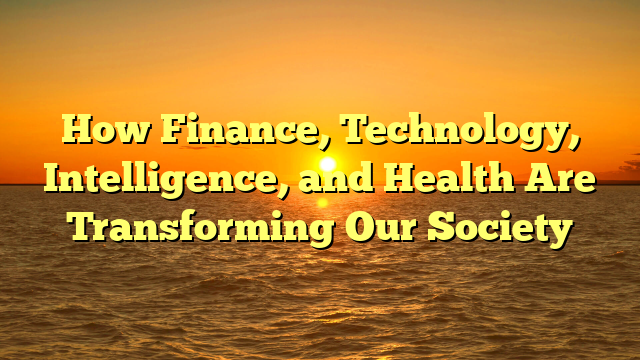In the modern era, the convergence of finance, technology, intelligence, and health is driving profound changes across the globe. togel online influences the others, fostering innovation and providing solutions to pressing global challenges. This article delves into how these fields are interconnected and how they will evolve in the coming years.
1. The Impact of Finance on Global Development
The financial world has evolved dramatically in recent years. Emerging technologies like blockchain, artificial intelligence, and machine learning are reshaping the financial landscape. These innovations have not only made financial transactions faster and more secure but also introduced entirely new ways to manage wealth, from cryptocurrency investments to robo-advisors. Financial institutions must adapt to these changes to meet the needs of a digital-savvy generation.
As we look ahead, the role of finance in fostering innovation cannot be underestimated. The availability of capital is essential for startups and emerging industries, particularly in tech and healthcare. However, the future of finance faces challenges such as cybersecurity threats, financial inequality, and the regulatory implications of new technologies. Governments and institutions will need to adapt their policies to ensure that financial systems remain resilient and inclusive, especially in light of global crises like pandemics and economic recessions.
2. The Role of Technology in Shaping Our Future
Technology is at the forefront of every major advancement today. From automation and artificial intelligence to the Internet of Things (IoT) and biotechnology, technological innovations are revolutionizing every aspect of our lives. One of the most significant impacts of technology is on the workforce. Automation, for example, is transforming industries by increasing efficiency while reducing human labor costs. However, this also raises questions about job displacement and the need for reskilling workers to adapt to new technological environments.
The intersection of technology and healthcare is creating groundbreaking changes in the way we monitor and manage our health. Innovations like telemedicine, AI-powered diagnostics, and personalized medicine are transforming healthcare delivery. With the advent of AI and big data, health professionals can offer more precise treatments, leading to better outcomes for patients worldwide.
3. The Rise of Artificial Intelligence and Intelligence Systems
Artificial intelligence is becoming an essential tool in numerous industries, offering solutions to complex problems and enhancing productivity. In healthcare, AI is used to predict patient outcomes, identify new drug therapies, and automate administrative tasks. In finance, AI is transforming how investment decisions are made, helping analysts predict trends and optimize portfolios. As AI continues to evolve, its applications will expand further, potentially reshaping the job market, economy, and society as a whole.
However, the rise of AI also raises ethical concerns. As AI systems become more sophisticated, there are concerns about privacy, job displacement, and the potential for biased decision-making. Ensuring that AI technologies are developed and implemented responsibly will be crucial for maximizing their benefits while minimizing negative impacts. Furthermore, the increasing reliance on AI could raise questions about human autonomy and control over decision-making.
4. Health and Well-being in the Digital Age
The role of technology in healthcare is growing rapidly, particularly in the realm of preventative care. Wearables like smartwatches and fitness trackers enable users to track vital statistics such as heart rate, sleep patterns, and physical activity. Additionally, telemedicine has made healthcare more accessible by allowing patients to consult with doctors remotely. As technology continues to evolve, we can expect even more innovative solutions that enhance our well-being and improve health outcomes worldwide.
As technology continues to advance, healthcare delivery will become more efficient and equitable. Innovations such as telemedicine and digital health services are breaking down geographical and financial barriers to healthcare, making essential services more accessible to people in remote areas or underserved communities. This transformation promises to improve health outcomes and promote a more inclusive global healthcare system.
Conclusion
The integration of finance, technology, intelligence, and health is reshaping the world in profound ways. As technological advancements continue to accelerate, the potential for these fields to drive positive change in society is immense. However, careful attention must be given to the ethical, regulatory, and social implications of these innovations to ensure that they benefit all people. By fostering collaboration across sectors, we can create a more prosperous, equitable, and healthier future.
